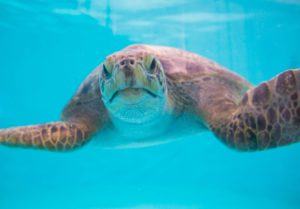Wildlife products now illegal to sell in Washington can be dropped off at Oct. 26 event.
FOR IMMEDIATE RELEASE: Sept. 25, 2019
TACOMA, Wash. – Have any ivory carvings tucked away at home? A shark fin souvenir? Grandma’s antique turtle-shell brooch?
 Thanks to the passing of the Washington Animal Trafficking Act – I-1401 – those wildlife products are now illegal to sell in Washington state without proper documentation, in order to protect endangered species from poaching. Yet there may be many South Sounders who still own such products, through inheritance or prior sale.
Thanks to the passing of the Washington Animal Trafficking Act – I-1401 – those wildlife products are now illegal to sell in Washington state without proper documentation, in order to protect endangered species from poaching. Yet there may be many South Sounders who still own such products, through inheritance or prior sale.
What to do with those items? Hand them over at Toss the Tusk from 10 a.m. – 2 p.m. Oct. 26 at Point Defiance Zoo & Aquarium and Northwest Trek Wildlife Park – no questions asked.
“By surrendering ivory or other animal products, you can ensure that these products will never be made available on the market,” explains Karen Povey, the conservation engagement manager for Point Defiance Zoo and Northwest Trek. “And by removing them from the market, we can reduce demand and keep elephants – and other amazing species – alive for generations to come.”
At drop-off stations outside the Zoo and Northwest Trek entrances, officials from the Washington Department of Fish & Wildlife – which enforces the Animal Trafficking Act – will gladly receive any products made from the 10 endangered species now illegal to sell under I-1401.
These species include: elephant, rhinoceros, tiger, lion, cheetah, leopard, lion, shark, sea turtle and ray. Products may include fins, bones, tusks, shells, pelts or any other animal part.
“It’s not illegal to possess these items, but it IS illegal to sell, buy or trade them,” Povey says. “That essentially makes them valueless. For some people, this is enough of a reason to rid themselves of these items. For others, the items may represent the senseless poaching or killing of an endangered animal for a trinket or piece of décor. People may appreciate the opportunity to turn them in to the authorities without questions.”
None of the items turned in will go inside the Zoo. Instead, they will be immediately in WDFW possession, to be used as educational tools or destroyed. No questions will be asked of those turning in products.
Simply bring the item to the drop-off zones at the zoos’ front entrances. A tent with signs will be visible, staffed by WDFW and zoo representatives. Drive or walk up to the tent and surrender your item to a uniformed staff member.
“Our police officers and staff work every day to stop illegal trade in both local and international wildlife, ensuring that species populations continue to grow and thrive for generations to come,” said WDFW director Kelly Susewind. “Working together to enforce this law sends a clear message that we will not tolerate poaching or trafficking of products from threatened or endangered species.”